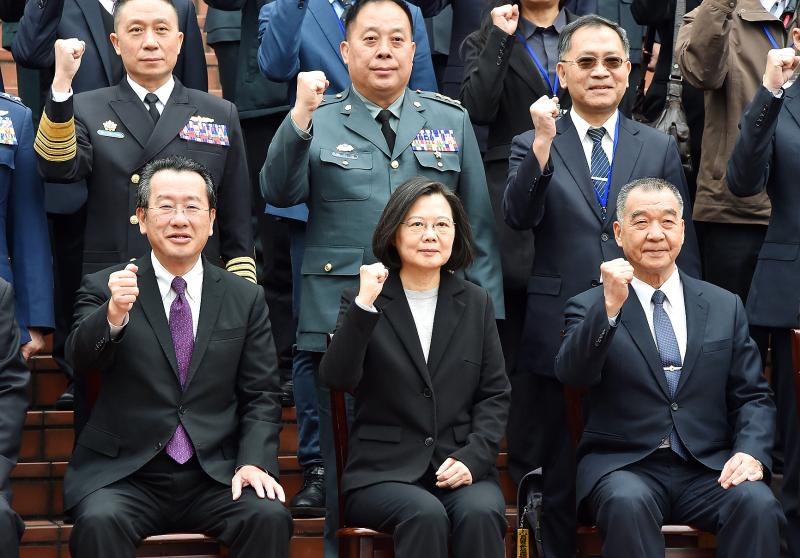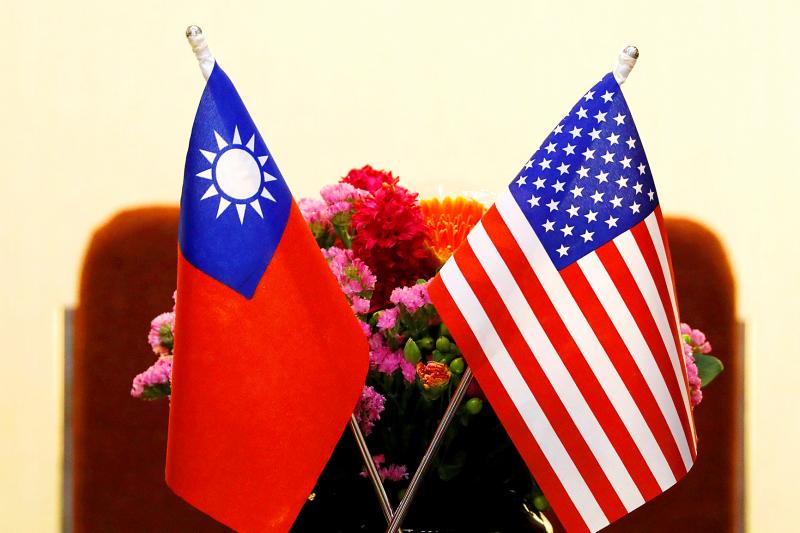Security talks between Taiwan and the US this week are to include discussion of military exercises and arms sales, a senior national security official said yesterday.
A delegation led by National Security Council Secretary-General Wellington Koo (顧立雄) is to participate in the annual Monterey Talks, considered to be the most important strategic collaboration between the two countries.
Although details are not made public as a matter of course, the United Daily News said working-level meetings are to be held from tomorrow to Friday ahead of high-level talks from Monday to Wednesday next week in Washington and Annapolis, Maryland.

Photo: Tu Chien-jung, Taipei Times
The talks, the second held since US President Joe Biden took office last year, are taking place against the backdrop of Russia’s war against Ukraine and increased Chinese military pressure on Taiwan.
Channels of communication between Taiwan and the US are clear, Presidential Office spokesman Xavier Chang (張惇涵) said yesterday when asked about the talks, while declining to comment on any agreements.
Ministry of Foreign Affairs spokeswoman Joanne Ou (歐江安) also declined to comment, saying only that the two nations would further deepen their cooperation on an already solid foundation.

Photo: Reuters
A senior national security official said on condition of anonymity yesterday that Washington is expected to focus on upgrades to existing equipment to enhance immediate combat capabilities as a response to uncertainties in the cross-strait situation.
This strategy differs from that of former US president Donald Trump’s administration, whose arms sales to Taiwan focused on new equipment, the official said, adding that cooperation on military exercises is also to be clarified.
Cooperation with the Republic of China Marine Corp would be an important topic, as the US Marine Corp has adjusted its strategy to act as “stand-in forces” for rapid deployment to the first island chain, the official said.
The US Marine Corp in December last year formalized the strategy in A Concept for Stand-In Forces.
Last month, Colonel Stephen Fiscus, assistant chief of staff for force development at US Marine Forces Pacific, said that the III Marine Expeditionary Force in Okinawa is focused on the “ability to stand in — by our footprints, our posture, our relationship with partners and allies — to kind of get the enemy in our guard” within their engagement zone, rather than remaining at a distance.
US military officials are emphasizing cooperation with allies, the official said, adding that shifting US priorities are in part due to heightened cross-strait tensions.
The US considers any Chinese military action in the first island chain to fall within its “weapons engagement zone,” they said.
The US Indo-Pacific Command’s engagement is “closer than people think,” with interactions shifting from “transactional” to “collaborative,” the official said.

DAREDEVIL: Honnold said it had always been a dream of his to climb Taipei 101, while a Netflix producer said the skyscraper was ‘a real icon of this country’ US climber Alex Honnold yesterday took on Taiwan’s tallest building, becoming the first person to scale Taipei 101 without a rope, harness or safety net. Hundreds of spectators gathered at the base of the 101-story skyscraper to watch Honnold, 40, embark on his daredevil feat, which was also broadcast live on Netflix. Dressed in a red T-shirt and yellow custom-made climbing shoes, Honnold swiftly moved up the southeast face of the glass and steel building. At one point, he stepped onto a platform midway up to wave down at fans and onlookers who were taking photos. People watching from inside

A Vietnamese migrant worker yesterday won NT$12 million (US$379,627) on a Lunar New Year scratch card in Kaohsiung as part of Taiwan Lottery Co’s (台灣彩券) “NT$12 Million Grand Fortune” (1200萬大吉利) game. The man was the first top-prize winner of the new game launched on Jan. 6 to mark the Lunar New Year. Three Vietnamese migrant workers visited a Taiwan Lottery shop on Xinyue Street in Kaohsiung’s Gangshan District (崗山), a store representative said. The player bought multiple tickets and, after winning nothing, held the final lottery ticket in one hand and rubbed the store’s statue of the Maitreya Buddha’s belly with the other,

‘NATO-PLUS’: ‘Our strategic partners in the Indo-Pacific are facing increasing aggression by the Chinese Communist Party,’ US Representative Rob Wittman said The US House of Representatives on Monday released its version of the Consolidated Appropriations Act, which includes US$1.15 billion to support security cooperation with Taiwan. The omnibus act, covering US$1.2 trillion of spending, allocates US$1 billion for the Taiwan Security Cooperation Initiative, as well as US$150 million for the replacement of defense articles and reimbursement of defense services provided to Taiwan. The fund allocations were based on the US National Defense Authorization Act for fiscal 2026 that was passed by the US Congress last month and authorized up to US$1 billion to the US Defense Security Cooperation Agency in support of the

‘COMMITTED TO DETERRENCE’: Washington would stand by its allies, but it can only help as much as countries help themselves, Raymond Greene said The US is committed to deterrence in the first island chain, but it should not bear the burden alone, as “freedom is not free,” American Institute in Taiwan Director Raymond Greene said in a speech at the Institute for National Defense and Security Research’s “Strengthening Resilience: Defense as the Engine of Development” seminar in Taipei yesterday. In the speech, titled “Investing Together and a Secure and Prosperous Future,” Greene highlighted the contributions of US President Donald Trump’s administration to Taiwan’s defense efforts, including the establishment of supply chains for drones and autonomous systems, offers of security assistance and the expansion of